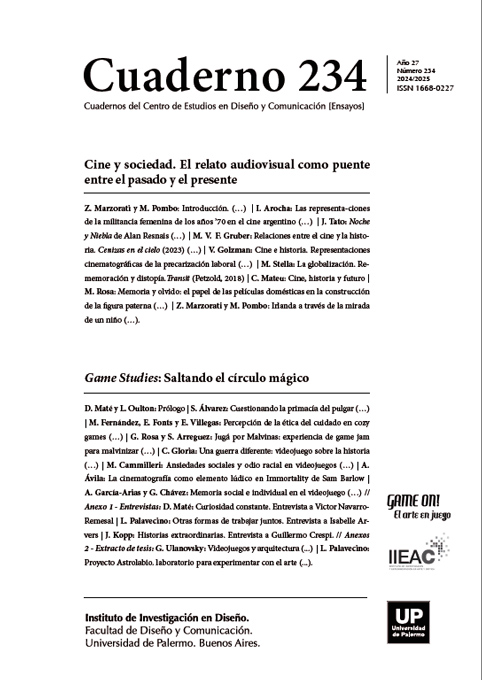Percepción de la ética del cuidado en cozy games: Spiritfarer, Stardew Valley y Animal Crossing: New Horizons
Resumen
Este trabajo explora la confluencia entre la ética del cuidado y los aspectos prosociales de los videojuegos desde la percepción que los jugadores tienen de los cuidados dentro y a través de los cozy games.
Citas
Batson, C. y Powell, A (2003). Altruism and Prosocial Behavior. En T. Millon y M. Lerner (Eds.), Handbook of Psychology: Personality and Social Psychology. John Wiley & Sons.
Belman, J., Flanagan, M (2010). Designing Games to Foster Empathy. Cognitive Technology, 18(2), 5-15.
Budiu, R. (1 de octubre de 2017). Quantitative vs. Qualitative Usability Testing. Nielsen Norman Group. https://www.nngroup.com/articles/quant-vs-qual/
Bryan, V. y Blackman, G. (2018). The Ethics of Self-Care in Higher Education. Emerging Perspectives, 3(2), 14-34.
Camps, V. (2021). Tiempo de cuidados: otra forma de estar en el mundo. Arpa Editores.
Craig, A.B., Brown, E.R., Upright, j. y DeRosier, M. (2016). Enhancing Children’s Social Emotional Functioning Through Virtual Game-Based Delivery of Social Skills Training. Journal of Child and Family Studies , 25, 959–968. https://doi.org/10.1007/s10826-015-0274-8
Dovidio, J. (1984). Helping Behavior and Altruism: an Empirical and Conceptual Overview. En L. Berkowitz (Ed.), Advances in Experimental Social Psychology. Academic Press.
Eisenberg, N., Eggum-Wilkens, N. D., y Spinrad, T. L. (2015). The Development of Prosocial Behavior. En D. A. Schroeder y W. G. Graziano (Eds.), The Oxford Handbook of Prosocial Behavior. Oxford University Press.
Eisenberg, N., y Miller, P. (1987). The Relation of Empathy to Prosocial and Related Behaviors. Psychological Bulletin, 101(1), 91-119. https://doi.org/10.1037/0033-2909.101.1.91
Flanagan, M., y Nissenbaum, H. (2014). Values at play in digital games. MIT Press.
Güemes, M. y Cos Montiel, F. (2023). Cuidados y ecofeminismo. Consolidar avances y construir futuros igualitarios en Latinoamérica. Fundación Carolina.
Held, V. (2006). The Ethics of Care: Personal, Political, Global. Oxford University Press.
Herrero, Y. (2022). Educar para la sostenibilidad de la vida. Una mirada ecofeminista a la educación. Octaedro.
Juul, J. (2010). A Casual Revolution: Reinventing Video Games and their Players. The MIT Press.
Koenitz, H. (2015). Towards a Specific Theory of Interactive Digital Narrative. En H. Koenitz (Ed.), Interactive Digital Narrative. History Theory Practice. Routledge.
Kolb, B., y Whishaw, I. Q. (2021). Fundamentals of Human Neuropsychology. Macmillan Learning.
Koo, G., y Seider, S. (2010). Video Games for Prosocial Learning. En K. Schrier, y D. Gibson, (Eds.), Ethics and Game Design: Teaching Values through Play. IGI Global. https://doi.org/10.4018/978-1-61520-845-6.ch002
Murphy, J., y Zagal, J. (2011), Videogames and the Ethics of Care. International Journal of Gaming and Computer-Mediated Simulations, 3(3), 69-81. https://doi.org/10.4018/jgcms.2011070105
Murray, J. H. (1997). Hamlet on the Holodeck: the Future of Narrative in Cyberspace. The MIT Press.
Narvaez, D., Mattan, B., MacMichael, C., y Squillace, M. (2008). Kill Bandits, Collect Gold or Save the Dying: the Effects of Playing a Prosocial Video Game. Media Psychology Review, 1 (1).
Navarro, V. (2020). Meditaciones. Modos Zen, contemplación y lentitud en el videojuego. En Navarro (Ed.) Pensar el juego. 25 caminos para los game studies. Shangrila.
Noddings, N. (2008). An ethic of Caring. En F. Kaufman (Ed.), Life’s Hardest Questions- Big and Small: An Introduction to Moral Ohilosophy. McGraw-Hill.
Pfattheicher, S., Asbjørn Nielsen, Y., y Thielmann, I. (2022). Prosocial Behavior and Altruism: A Review of Concepts and Definitions. Current Opinion in Psychology, 44, 124–129. https://doi.org/10.1016/j.copsyc.2021.08.021
Prot, S., Anderson, C. A., Gentile, D. A., Brown, S. C., y Swing, E. L.(2014). The Positive and Negative Effects of Video Game Play. En A. Jordan y D. Romer (Eds.). Media and the Well-Being of Children and Adolescents. Oxford University Press.
Reja, U., Manfreda, K.L., Hlebec, V., y Vehovar, V. (2003). Open‐ended vs. Closeended Questions in Web Questionnaires. Developments in Applied Statistics 19, 159–177.
Russoniello, C. V. (2009). The Effectiveness of Casual Video Games in Improving Mood and Decreasing Stress. Journal of Cyber Therapy & Rehabilitation, 53–66.
Schrier, K. (2017). Designing Games for Moral Learning and Knowledge Building. Games and Culture, 14 (4), 306-343. https://doi.org/10.1177/1555412017711
Schroeder, D., Graziano, W. (2015). The Field of Prosocial Behavior. En D. Schroeder, y W. Graziano (Eds.). The Oxford Handbook of Prosocial Behavior. Oxford University Press.
Sestir, M. A., y Bartholow, B. D. (2010). Violent and Nonviolent Video Games Produce Opposing Effects on Aggressive and Prosocial Outcome. Journal of Experimental Social Psychology, 46, 934-942. https://doi.org/10.1016/j.jesp.2010.06.005
Short,T., Hurd, D., Forbes, J., Diaz, J., Ordon, A., Howe, C., Eiserloh, S. y Cook, D. (2017). The Twelfth Annual Game Design Think Tank. Project Horseshoe 2017. https://www.projecthorseshoe.com/reports/featured/ph17r3.htm
Sicart, M. (2009). The Ethics of Computer Games. The MIT Press.
Turkle, S., Taggart, W., Kidd, C., y Daste, O. (2006). Relational Artifacts with Children and Elders: The Complexities of Cybercompanionship. Connection Science, 18(4), 347–361. https://doi.org/10.1080/09540090600868912
Unsworth, N. (2019). Individual Differences in Long-Term Memory. Psychological Bulletin, 145(1), 79–79. https://doi.org/10.1037/bul0000176
Waszkiewicz, A. y Bakun, M. (2020) Towards the Aesthetics of cozy video games. Journal of Gaming & Virtual Worlds, 12(3), 225-240. https://doi.org/10.1386/jgvw_00017_1
Los autores/as que publiquen en esta revista ceden los derechos de autor y de publicación a "Cuadernos del Centro de Estudios de Diseño y Comunicación", Aceptando el registro de su trabajo bajo una licencia de atribución de Creative Commons, que permite a terceros utilizar lo publicado siempre que de el crédito pertinente a los autores y a esta revista.


